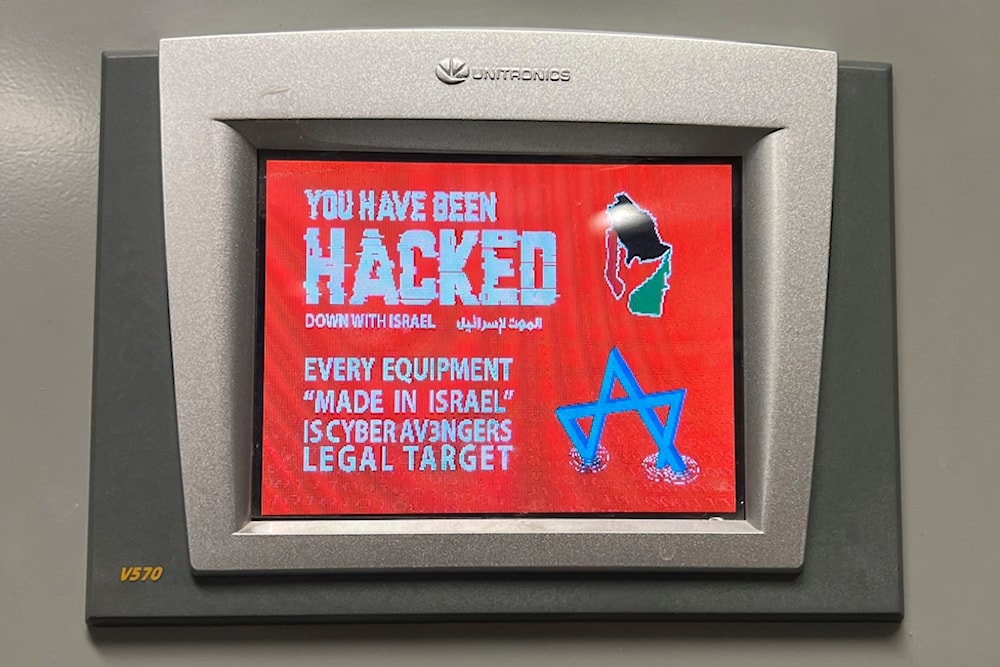War expansion north could lead to 'economic darkness': Israeli media
Israeli media discusses in a report the scenario of "economic darkness," which addresses the risks of a full-scale war in the north on the security of the Israeli financial market.
-

This photo provided by the Municipal Water Authority of Aliquippa shows the screen of a Unitronics device that was hacked in Aliquippa, Pa., Saturday, Nov. 25, 2023 (AP)
The Israeli newspaper Yedioth Ahronoth, in a report, talked about the "economic darkness" scenario, which deals with the risks of a potential all-out war in the north on the security of the Israeli occupation's capital market, starting from cyber attacks and continuous hacks, through the fear of data leaks and the interruption of vital services, to the flight of investors in the stock market.
In detail, the newspaper reported that in addition to the rush for generators and emergency food supplies due to the fear of war in the north, "there are those working around the clock to fortify the defense wall of the capital market against the threat of an attack that could shake the Israeli economy."
"Such a scenario is not separated from reality," read the newspaper. According to the Cyber Warfare Formation's report during Operation al-Aqsa Flood, "so far this year, more than 3,380 cyber attacks have been launched against companies traded on the Israeli stock exchange, 800 of which were identified as potentially damaging."
The Formations' report noted receiving 13,040 reports throughout 2023, verified as cyber events from civilians and organizations. It added that 68% of these attacks "occurred during the Gaza war (from October 7 to December), representing a 43% increase in attack reports compared to 2022."
At what cost?
According to an economic analysis of the damages caused by cyberattacks in "Israel" last year, the Cyber Warfare division estimates that "the total cost is approximately 12 billion shekels annually (around 3.5 billion dollars), a record amount reflecting only the potential economic damage that could occur during a strong northern war," according to Israeli experts.
In this context, Aviv Hooker, co-founder of Faddom, a company that manages a program for mapping and documenting computer infrastructures used by some of the largest commercial companies in "Israel" such as the Israeli bank, warned about this scenario, saying that "the damage to the Israeli economy and capital market could reach hundreds of millions per day."
Hooker emphasized that "the war with Hamas, along with threats from Iran and Hezbollah, has highlighted the need for strong national security measures," but nonetheless, "the cyber front remains one of Israel's most vulnerable battlefields."
He pointed out that "the cyber formations of Iran and Hezbollah have become more advanced over time," and that "the threats of attacks and the likelihood of their occurrence have increased with this progress."
Hooker further explained that Israeli companies and entities must adopt an approach that assumes threats can come from anywhere without warning and that they could quickly find themselves in trouble.
For example, "a cyberattack on the Tel Aviv stock exchange could cause severe economic damage comparable to security damage," he said, adding that "such a disruption by a hostile entity could drive investors away from the market, causing significant harm to financial stability and impacting every Israeli's pocket."
According to Yedioth Ahronoth, this "economic darkness" scenario "keeps many economists awake at night," noting that the top ten exits of Israeli companies, eight of which were in the cyber field, with sales amounting to about 2.8 billion dollars, accounting for about 80% of all Israeli high-tech exits this year, is "not for nothing."
Inevitable escalation
In a related context, the Israeli news website Walla! reported last April that cyberattacks on "Israel" increased by about 43%, claiming they were sponsored by Iran and Hezbollah.
Data SEC, a company from the SQLink group specializing in information security and cyber solutions, predicted in a report published by Walla that there would be a significant escalation in the volume of cyberattacks and the likelihood of destroying government sites and companies, especially those related to national infrastructure in "Israel," as part of a coordinated anti-"Israel" cyber campaign.
Gabi Portnoy, head of the Israeli national Cyber Warfare Formation, said that "the year 2024 will be marked by the continuation of the war and the potential for its expansion into additional arenas, coinciding with the improvement of cyber capabilities among enemies and their readiness to carry out attacks that cause damage to Israel's civilian home front."
Read more: Free Palestinian detainees or Israeli security data be sold: Hackers

 4 Min Read
4 Min Read








